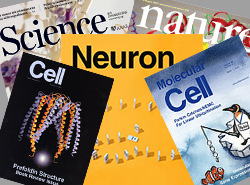Publication of IMPRS-LS student Marius Schneider

Schneider, M.F., Müller, V., Müller, S.A., Lichtenthaler, S.F., Becker, P.B., and Scheuermann, J.C.
Life Sci Alliance 5.
doi: 10.26508/lsa.202201504
LncRNA RUS shapes the gene expression program towards neurogenesis
The evolution of brain complexity correlates with an increased expression of long, noncoding (lnc) RNAs in neural tissues. Although prominent examples illustrate the potential of lncRNAs to scaffold and target epigenetic regulators to chromatin loci, only few cases have been described to function during brain development. We present a first functional characterization of the lncRNA LINC01322, which we term RUS for "RNA upstream of Slitrk3." The RUS gene is well conserved in mammals by sequence and synteny next to the neurodevelopmental gene Slitrk3. RUS is exclusively expressed in neural cells and its expression increases during neuronal differentiation of mouse embryonic cortical neural stem cells. Depletion of RUS locks neuronal precursors in an intermediate state towards neuronal differentiation resulting in arrested cell cycle and increased apoptosis. RUS associates with chromatin in the vicinity of genes involved in neurogenesis, most of which change their expression upon RUS depletion. The identification of a range of epigenetic regulators as specific RUS interactors suggests that the lncRNA may mediate gene activation and repression in a highly context-dependent manner.
